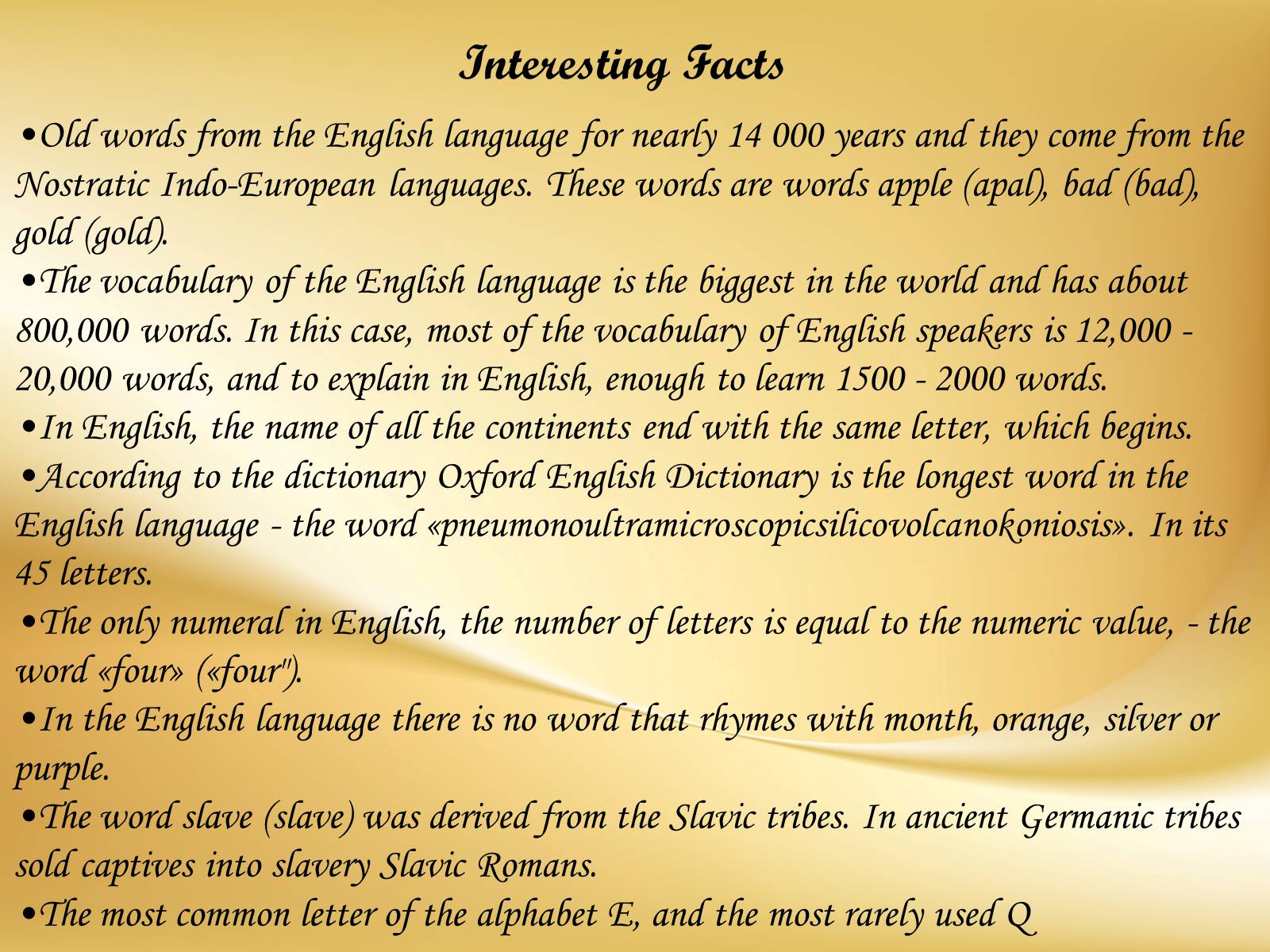- Головна
- Готові шкільні презентації
- Презентація на тему «Why do I like English?»
Презентація на тему «Why do I like English?»
258
Слайд #1
Why do I like English?
HEC «Secondary school №4
multidisciplinary lyceum `Elite`»
Form 10A
Naumenko Eugenia
HEC «Secondary school №4
multidisciplinary lyceum `Elite`»
Form 10A
Naumenko Eugenia
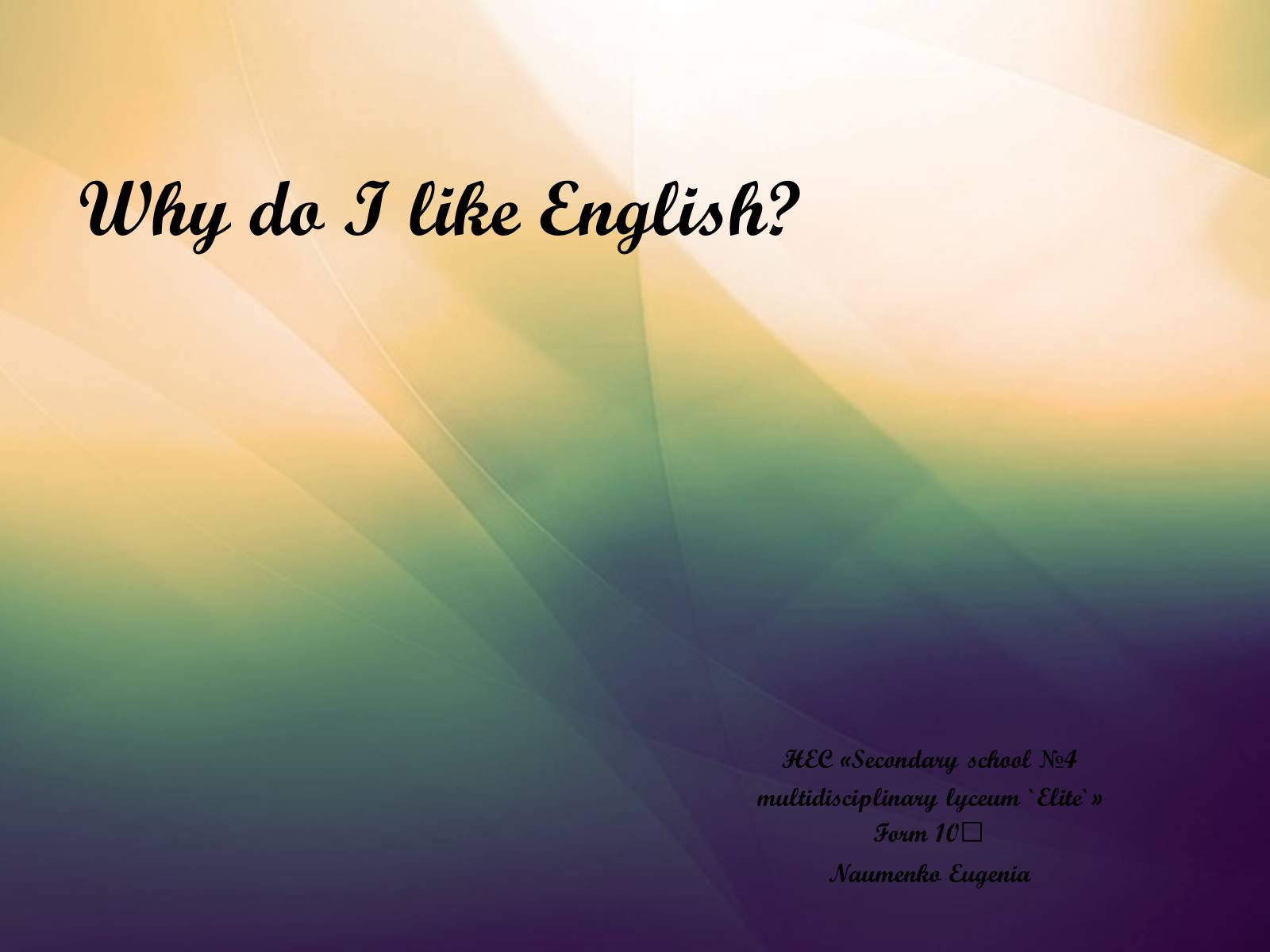
Слайд #2
Know a lot of languages - to have a lot of keys to one lock. Voltaire
There is no doubt that English is becoming more popular.
We want to get a good job - you need English. If we want to communicate with people from other countries, or simply to maintain a business relationship - again, no English is necessary.
That is, the study of English in our time is a necessity. But there are those who learn the language, because I just like it.
There is no doubt that English is becoming more popular.
We want to get a good job - you need English. If we want to communicate with people from other countries, or simply to maintain a business relationship - again, no English is necessary.
That is, the study of English in our time is a necessity. But there are those who learn the language, because I just like it.
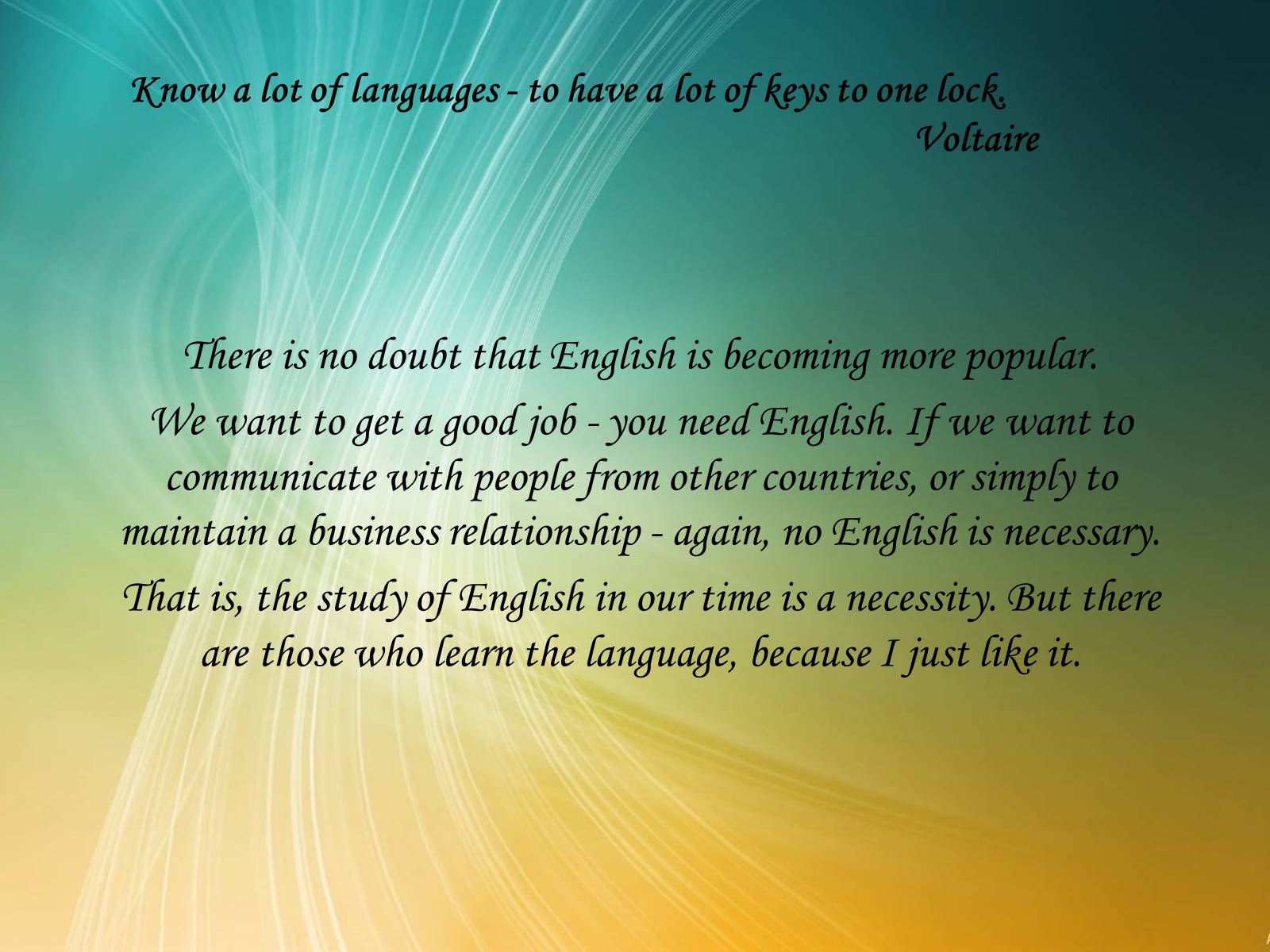
Слайд #3
I've been studying English since I was eight. Nobody made me, it was my decision. Now I know English pretty well. I have a lot of friends from different countries and I began to learn English to talk to them easily. I like to read very much and I would like to read some classical works of English authors in the original. It is interesting and absorbing reading. Reading English books I improve my memory and my pronunciation of English words becomes better. Pupils who speak English well have more opportunities to enter prestigious university. I want to achieve much in my life and that's why English is necessary for me. I like travelling and when I grow up I want to visit many countries. English is considered one of the international languages

Слайд #4
Also I think English is very beautiful and melodic language, plus all this still dynamic. Such a wonderful group of world-renowned Beatles : or a great singer Madonna and her rhythmic motifs, like a waterfall :
`Happiness lies in your own handIt took me much too long to understandHow it could beUntil you shared your secret with me…`
`When I find myself in times of troubleMother Mary comes to meSpeaking words of wisdom let it beAnd in my hour of darknessShe is standing right in front of meSpeaking words of wisdom let it be…`
`Happiness lies in your own handIt took me much too long to understandHow it could beUntil you shared your secret with me…`
`When I find myself in times of troubleMother Mary comes to meSpeaking words of wisdom let it beAnd in my hour of darknessShe is standing right in front of meSpeaking words of wisdom let it be…`
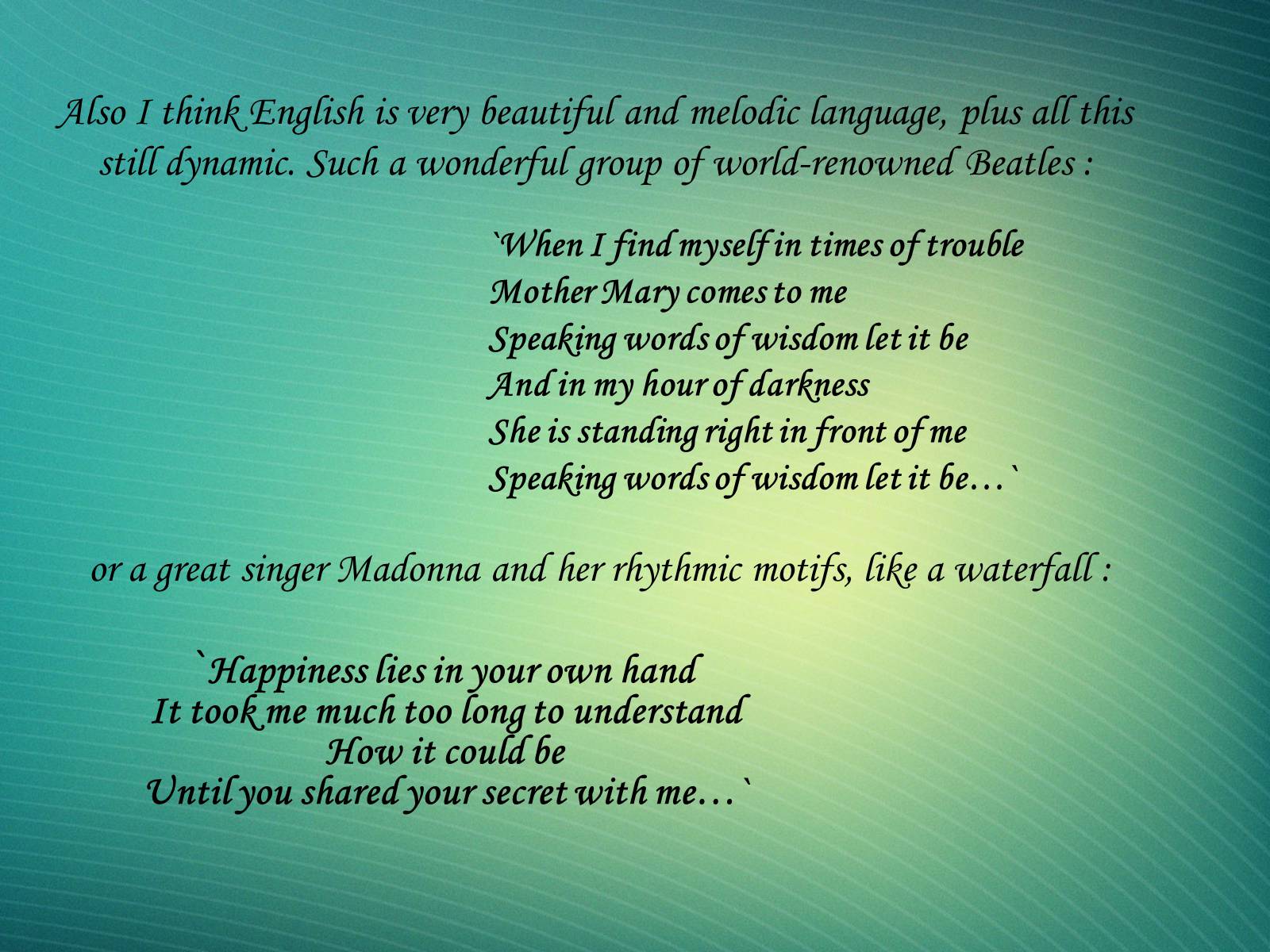
Слайд #5
The international language
English - the language of the English (the official language of England), the U.S. population (the official language of thirty-one of the state), one of the two official languages of Canada, Ireland and Malta, the official language of Australia and New Zealand. It is used as an official in some Asian countries (India, Pakistan, etc.) and Africa. English speakers in linguistics called Anglophones, especially the term common in Canada.
Refers to the Germanic languages Indo-European family of languages.
Number of carriers - about 410 million
speakers - about 1 billion people.
One of the six official and
working languages of the UN.
English - the language of the English (the official language of England), the U.S. population (the official language of thirty-one of the state), one of the two official languages of Canada, Ireland and Malta, the official language of Australia and New Zealand. It is used as an official in some Asian countries (India, Pakistan, etc.) and Africa. English speakers in linguistics called Anglophones, especially the term common in Canada.
Refers to the Germanic languages Indo-European family of languages.
Number of carriers - about 410 million
speakers - about 1 billion people.
One of the six official and
working languages of the UN.
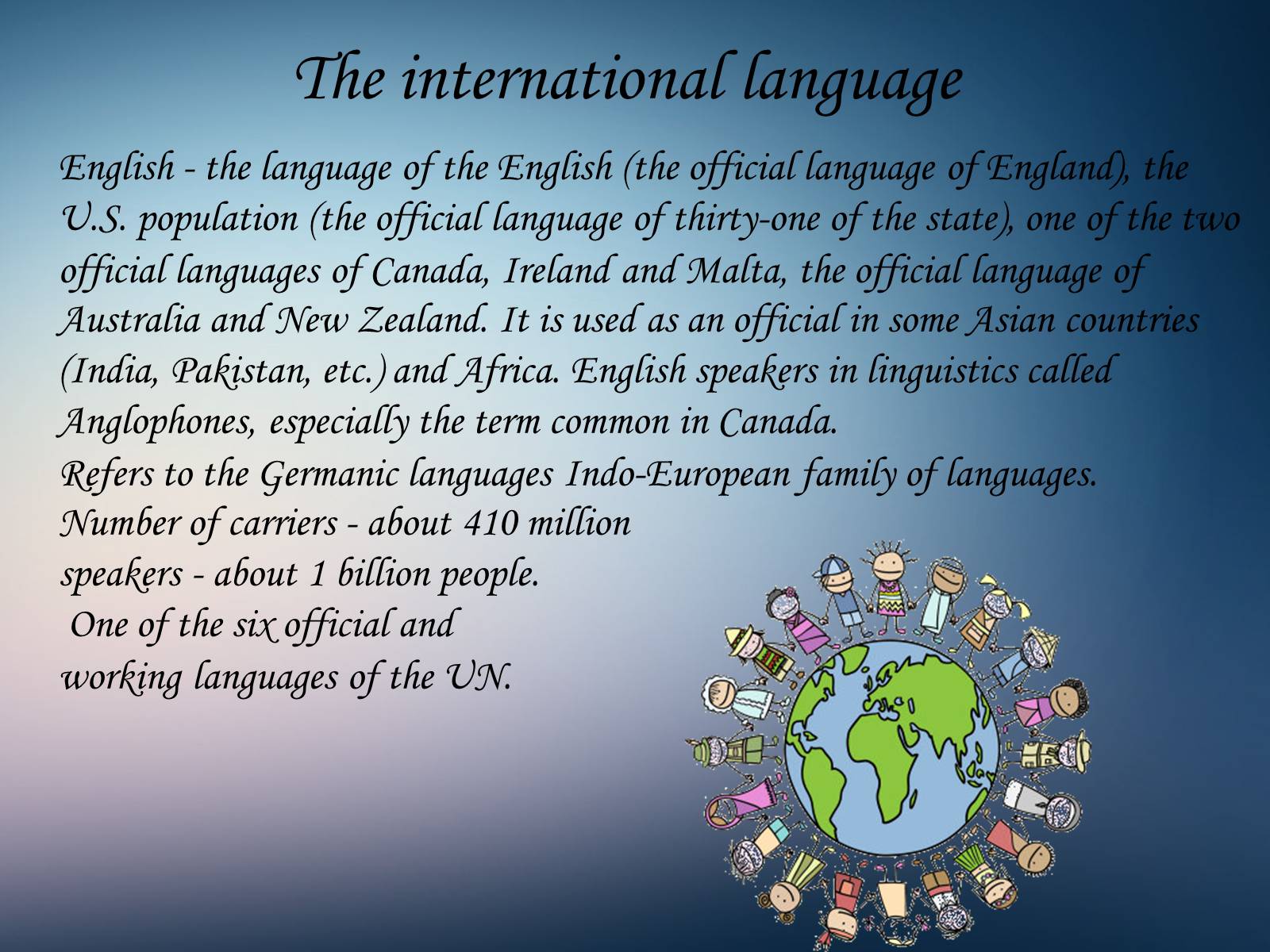
Слайд #6
History of this great language
History of the English language is divided into three periods:
•Old English period
Settled in the middle of the V century in Britain Anglo-Saxons entered into a fierce struggle with the indigenous local people - the Celts. This contact with the Celts almost been no effect on the structure of the Old English language, nor in his vocabulary. Not more than eighty Celtic words preserved in Old English monuments. Such a weak effect on the Celtic Old English can be explained by the weakness of the Celtic culture in comparison with the winners of the Anglo-Saxons. The influence of the Romans, who owned part of the territory of Britain for 400 years and greater. Another layer of Latin words which dates back to the penetration of Christianity in Britain. Of about 150 words. These words are also deeply entered the language and become a part of it, along with the indigenous Germanic words.
History of the English language is divided into three periods:
•Old English period
Settled in the middle of the V century in Britain Anglo-Saxons entered into a fierce struggle with the indigenous local people - the Celts. This contact with the Celts almost been no effect on the structure of the Old English language, nor in his vocabulary. Not more than eighty Celtic words preserved in Old English monuments. Such a weak effect on the Celtic Old English can be explained by the weakness of the Celtic culture in comparison with the winners of the Anglo-Saxons. The influence of the Romans, who owned part of the territory of Britain for 400 years and greater. Another layer of Latin words which dates back to the penetration of Christianity in Britain. Of about 150 words. These words are also deeply entered the language and become a part of it, along with the indigenous Germanic words.
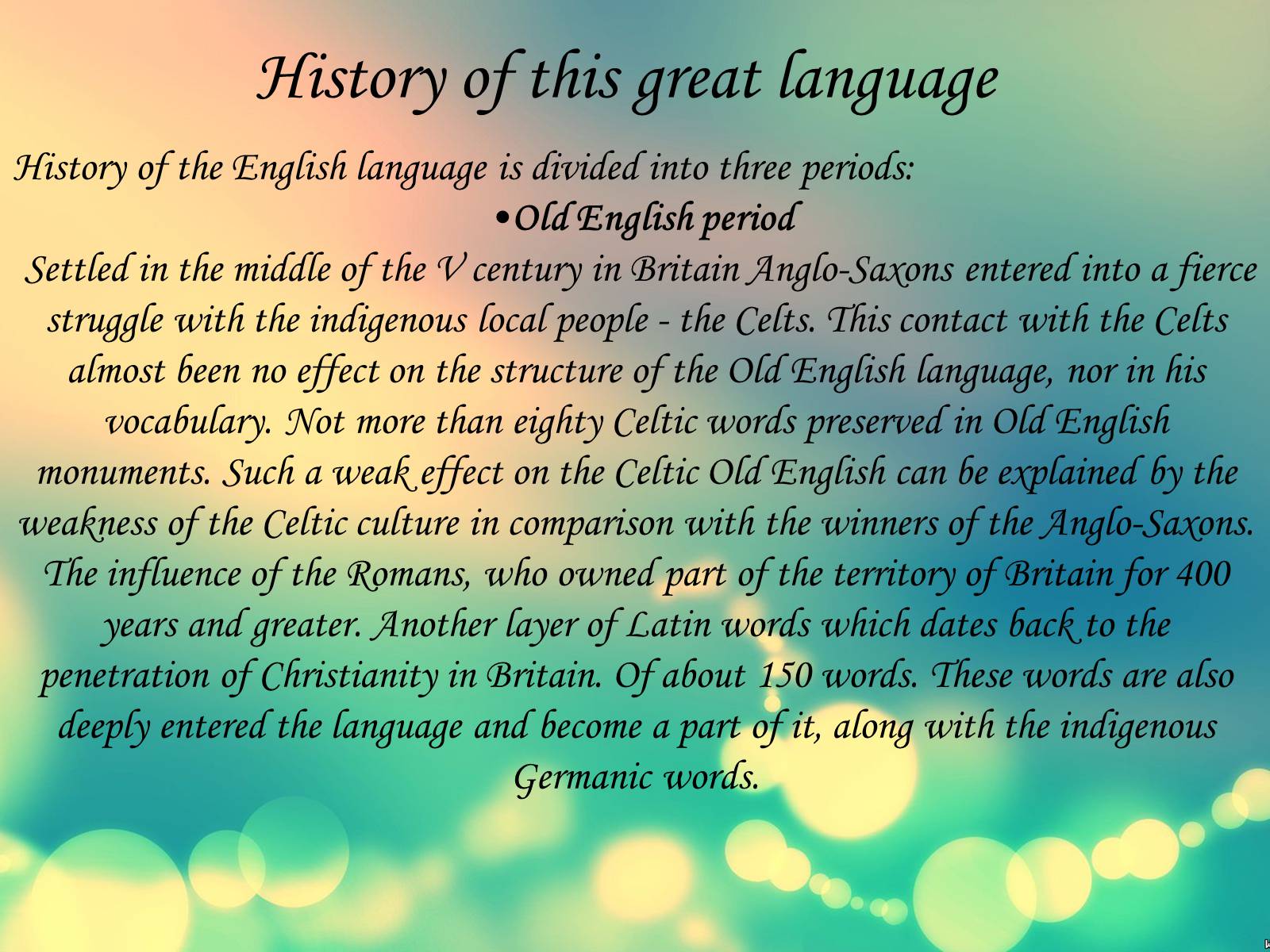
Слайд #7
•Middle English periodThe next period in the development of the English language covers the period from 1066 to 1485 years. Invasion feudal Normans in 1066 introduced a new powerful Old English lexical layer of so-called Normanism - words that go back to Norman-French dialect of Old French, spoken by the conquerors.•New England during theFollow-up period of the English language, which belongs to the state and the language of modern Britain, from the end of the XV century. With the development of printing and mass distribution of books is binding normative literary language, phonetics and spoken language continues to change, gradually moving away from the lexical rules. A significant development was the establishment of English in the British colonies of diaspora dialects.
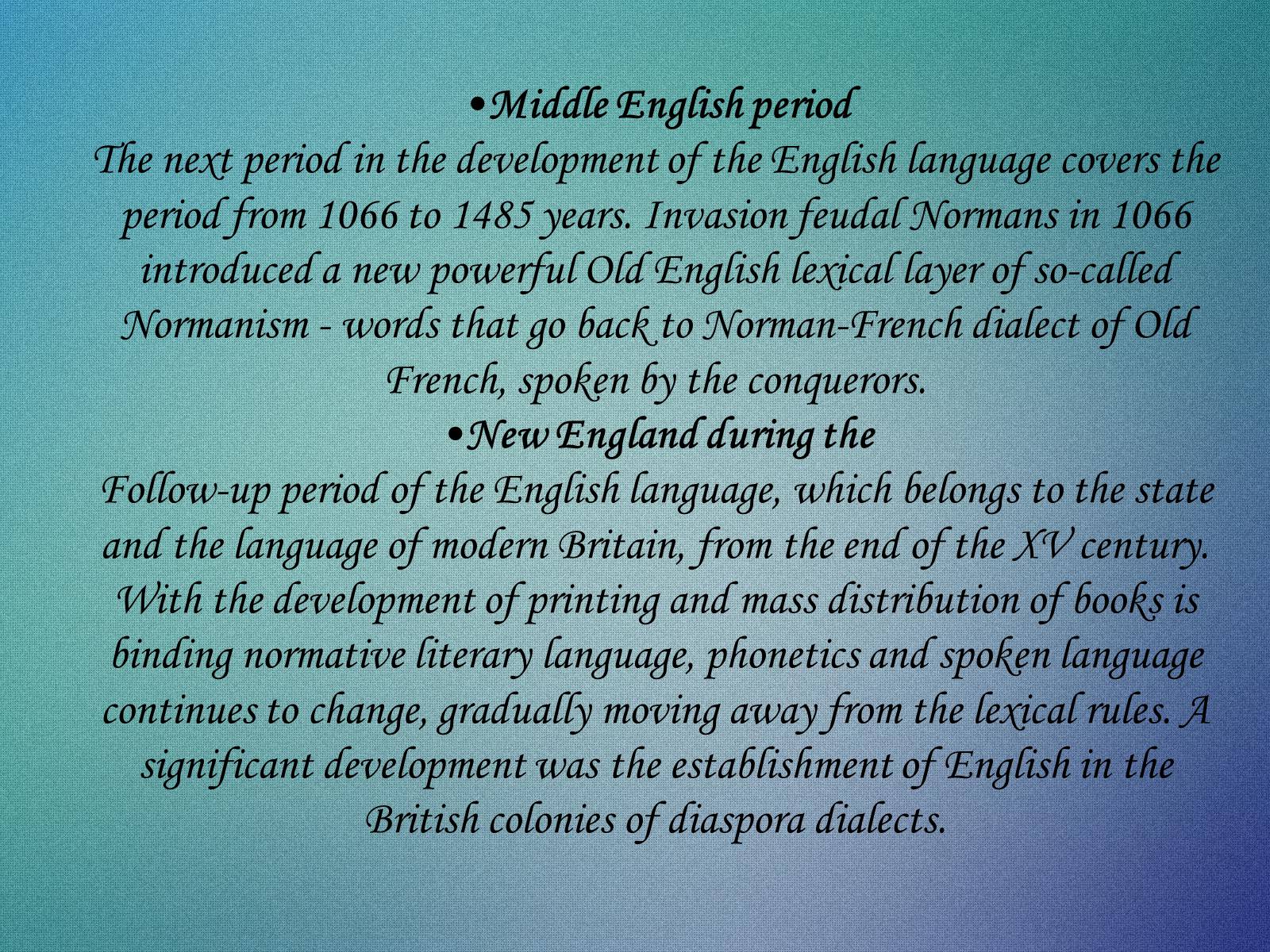
Слайд #8
•Old words from the English language for nearly 14 000 years and they come from the Nostratic Indo-European languages. These words are words apple (apal), bad (bad), gold (gold).•The vocabulary of the English language is the biggest in the world and has about 800,000 words. In this case, most of the vocabulary of English speakers is 12,000 - 20,000 words, and to explain in English, enough to learn 1500 - 2000 words.•In English, the name of all the continents end with the same letter, which begins.•According to the dictionary Oxford English Dictionary is the longest word in the English language - the word «pneumonoultramicroscopicsilicovolcanokoniosis». In its 45 letters.•The only numeral in English, the number of letters is equal to the numeric value, - the word «four» («four").•In the English language there is no word that rhymes with month, orange, silver or purple.•The word slave (slave) was derived from the Slavic tribes. In ancient Germanic tribes sold captives into slavery Slavic Romans.•The most common letter of the alphabet E, and the most rarely used Q
Interesting Facts
Interesting Facts
